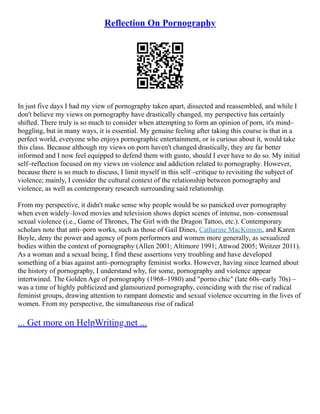The proliferation of pornography in contemporary society has become an omnipresent phenomenon, engendering a plethora of implications that reverberate through individual lives, familial structures, and societal norms. Within the framework of Baha’i teachings, which champion the intrinsic value of human dignity, relational sanctity, and spiritual development, it is imperative to deliberate upon the effects of pornography. Not merely a matter of personal inclination, the exploration of this topic facilitates a deeper understanding of its ramifications in the context of collective human experience.
To articulate the Baha’i perspective on pornography, one may invoke the metaphor of a river. Just as a river can nourish crops and sustain life, so too can intimate connections flourish when cultivated with care and mutual respect. However, when that river becomes tainted by pollutants—much like the insidious influences of pornography—it has the potential to destroy rather than sustain. This discourse seeks to elucidate how pornography not only contaminates sacred relationships but also alters our perceptions of love, intimacy, and morality.
At the core of Baha’i teachings lies the principle of chastity and the exalted status of marital unity. Baha’u’llah, the Founder of the Baha’i Faith, emphasizes that sexual relations are to be enjoyed within the sanctity of marriage, permitting a framework wherein love and trust can flourish. Pornography, often marred by objectification and exploitation, undermines this sacred covenant. The viewing of such material can engender warped perceptions of physical intimacy, reducing profound experiences to mere physical transactions devoid of emotional connection. In this regard, the Baha’i teachings challenge individuals to recognize the inherent dignity of every human being and to honor the sanctity of loving relationships.
Moreover, engaging with pornography can warp the individual’s understanding of consent and commitment. In an age where the accessibility of explicit content proliferates like wildfire, the habitual consumption of pornography can lead to desensitization. The allure of novelty often supersedes the deeper emotional connections that accompany genuine relationships. Thus, individuals may find themselves adrift in a sea of superficial engagements, rendered incapable of forming lasting bonds, reminiscent of ships that sail without anchors. The teachings stress that true love requires patience and nurturing, qualities that are starkly antithetical to the ephemeral gratification sought through pornography.
Further compounding these issues, the Baha’i perspective posits that the effects of pornography extend not only to the individual but also to the societal fabric. Within the context of shared community life, the normalization of pornography can yield pernicious effects on interpersonal dynamics and ethical standards. When sexual objectification becomes commonplace, it engenders a culture wherein hierarchies of power often reinforce misogyny and marginalization. Such cultural constructs dilute the ethos of equality that is central to Baha’i thought. It is essential, therefore, for individuals to reflect critically on how their choices contribute to this collective psyche, ultimately cultivating a more elevated and just society.
The insidious nature of pornography is evident in its cognitive impacts as well. Extensive research suggests that sustained exposure to pornographic content can lead to altered neural pathways, akin to the effects of substance dependencies. Cognitive distortions may arise, skewing one’s understanding of sexuality, beauty, and intimacy. The Baha’i teachings encourage self-reflection and the pursuit of knowledge, urging individuals to cultivate their minds, hearts, and souls. In doing so, one can realize the profound truth that genuine connection transcends mere physicality, enveloping emotional and spiritual dimensions that pornography ultimately fails to address.
To navigate the tumultuous waters of this issue, Baha’i principles advocate for comprehensive education centered around human sexuality and relationships. Initiating open dialogues within families and communities fosters greater awareness and understanding of the emotional and ethical considerations surrounding pornography. By instilling a foundation of respect and empathy, individuals are nurtured to appreciate the depth of human experience, redefining their adherence to relationships grounded in love, support, and shared values.
In conclusion, the effects of pornography permeate the individual and societal dimensions alike, diluting the sanctity of interpersonal relationships while distorting perceptions of love and intimacy. Baha’i teachings stand resolutely against such detrimental influences, promoting a vision of unity, respect, and genuine connection. Embracing the values of purity and fidelity not only enriches personal lives but also contributes to the collective spiritual evolution of humanity. Ultimately, the choice remains with each individual: to navigate the currents of contemporary temptation or to anchor oneself in the timeless principles that lead to true, fulfilling relationships. In this choice lies the potential for transformation—that profound journey towards a more compassionate, understanding, and equitable world.
